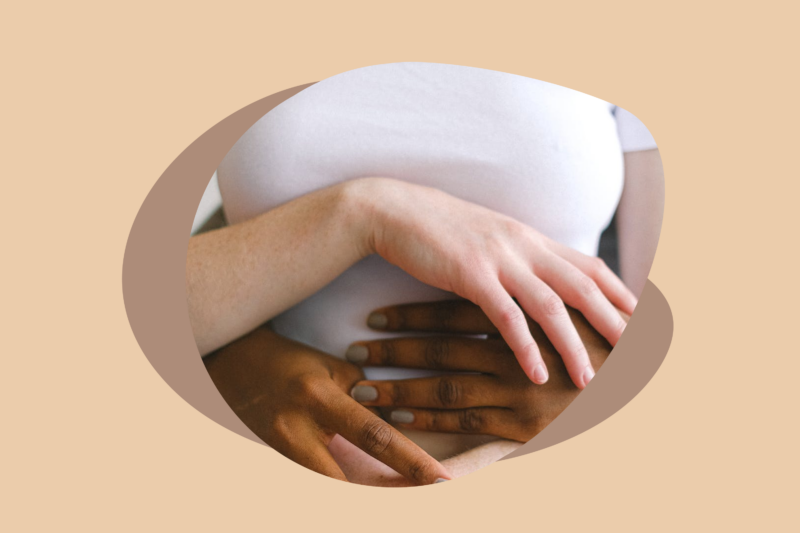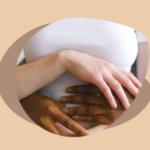Can You Get Pregnant During Perimenopause?

Perimenopause describes the natural decline in your fertility and transition to menopause. As you age, your fertility naturally declines and after age 40 it becomes increasingly unlikely that you will conceive. Once you’ve reached menopause, defined as the lack of a menstrual period for 12 consecutive months, you no longer have the ability to conceive naturally. But in the lead up to this milestone, your hormones are fluctuating and even though you are “unlikely” to get pregnant during perimenopause, it’s still a possibility.
The chances of pregnancy in perimenopause are smaller, and often misunderstood, but it IS still possible. If the question is “Сan you get pregnant during perimenopause?” the answer is a resounding yes! You can get pregnant during perimenopause! In this article we’ll go over how pregnancy is possible during perimenopause, the risks involved, and practical tips to increase your chances of conceiving.
Understanding Pregnancy During Perimenopause: Myths and Realities
There are a lot of misconceptions about age and fertility, especially when it comes to perimenopause. Many people mistakenly believe that you can’t have a healthy pregnancy in perimenopause, or that it’s unlikely you’ll become pregnant so you don’t need contraception.
Despite a decline in fertility during this stage, you can still become pregnant during perimenopause. Unless you are in full menopause it’s safe to assume you are still capable of conceiving during perimenopause.
Declining and erratic hormone levels contribute to decreases in fertility, but natural conception is still possible for women until menopause is reached (we even wrote a guide to which sex positions to try when TTC). Pregnancy during perimenopause may have increased risk factors (along with decreased odds of success), but it is still very much possible to get pregnant during perimenopause.
What Is Perimenopause?
Perimenopause is the stage before or around menopause that is characterized as a transitional phase on the way to full menopause. While menopause is defined as having no period for at least a year, the transitional phase the body goes through leading up to this can be called perimenopause. Peri, from Greek and Latin meaning around, is used to describe the phase around menopause.
Women experience perimenopause at different ages, but changes in your cycle can start as early as your late 30’s and typically affect women during their 40’s. The classic symptoms of perimenopause include irregular periods, hot flashes, night sweats, low libido, fatigue, irritability, brain fog, and sleep issues. Perimenopause periods may be heavier or lighter than normal, and you may even begin to have spotting between periods along with the classic change in cycle length.
Most people will be in perimenopause by their late 40’s regardless of whether they’ve had children or not, but there is research to suggest a difference for those who haven’t given birth. The average age for a childless woman to start perimenopause is thought to be lower than those who have been pregnant. Perimenopause age will be different for everyone since the transition to menopause is deeply individual and unique. Regardless of age of onset, both perimenopause and menopause are part of the same life stage but have different symptoms and therefore different treatment options.
The Transition to Menopause
During perimenopause, your menstrual cycle may become irregular. The closer you get to menopause, the more time will pass between each menstrual period. Your periods become fewer and farther between due to anovulation, or the body’s failure to release an egg during the menstrual cycle.
During this time, the hormones guiding fertility fluctuate and long-term hormone patterns begin to change. Estrogen and progesterone gradually decline, while follicle-stimulating hormone (FSH) and luteinizing hormone (LH) gradually increase in perimenopause and stay elevated during menopause. This gradual shift in hormone levels and patterns doesn’t happen in a straight line though and can affect ovulation. You may ovulate on some cycles and not at all on others as your ovaries stop working and hormone levels change.
For insight into how your hormones are fluctuating, you can track hormone levels at home with Mira’s Menopause Transitions Kit. This kit (which includes the Mira Hormone Monitor, Mira Max Wands, and Ovum Wands) enables you to track four key reproductive hormones in urine, including:
- Estrogen-Estradiol Metabolite (E3G) – a biomarker for estradiol
- Pregnanediol Glucuronide (PdG) – a biomarker for progesterone
- Luteinizing Hormone (LH)
- Follicle-stimulating Hormone (FSH)
When tracked over time in the Mira App, you can see first-hand how your transition to menopause is going. You can see if you’re still ovulating and fertile. You can also keep track of how your perimenopausal symptoms change alongside hormonal fluctuations.

In perimenopause, you may go several cycles without ovulating, but that does not mean you cannot ovulate at all. Women in perimenopause do, however, have fewer eggs. The quality of their eggs also declines, making it more difficult to get pregnant.
As soon as you ovulate, your fertile window also returns — and so do your chances of becoming pregnant. This means that you may go several menstrual cycles without ovulating during perimenopause, only to ovulate again months later.
When Does Perimenopause Typically Start?
You can start to see perimenopause eight to ten years before you reach full menopause. Not everyone will go through the same length or severity of symptoms though and perimenopause typically starts in your mid-40’s. Your premenopausal age can start as early as your 30’s and go as late as your 50’s. When you go through menopause earlier than expected, like in your 30’s, it’s known as premature or early menopause. Some people assigned female at birth experience early or premature menopause due to illness or medical procedures as well.
The first sign of perimenopause is often irregular periods due to changing hormone levels. This can be easier to notice if you are tracking your cycle but even changes to your period, like being lighter or heavier than your normal, can signal the start of this stage of your fertility.
Can You Get Pregnant During Perimenopause?
So, can you get pregnant during perimenopause? The answer is a resounding YES, but there are factors to consider that will impact your chances of success. Declining estrogen levels may impact your ovulation, making it spotty or non-existent at times, and periods may become irregular or less frequent. As long as ovulation is still occurring, it is still possible to get pregnant, but the number and quality of eggs will continue to reduce over time.
The older you are, the more likely you are to have additional health factors that may interfere with conception. These include high blood pressure, genetic predispositions, and conditions of the cervix and ovaries. Regardless of age-related decline, your chances of pregnancy in perimenopause are greatly reduced but not altogether impossible.
The Science Behind Conception in Perimenopause
Declining estrogen and progesterone levels can wreak havoc on your cycle, and it’s common for your cycle length to become more irregular and even shorten over time. This can, in turn, affect how early ovulation happens. Ovulation is the point during the menstrual cycle when the ovaries release an egg, and if an egg is not released through ovulation, conception is not possible. Even sporadic or infrequent ovulation can still allow for a pregnancy, regardless of age. As long as you are ovulating, you can still get pregnant (even in perimenopause).
Whether you are trying to conceive, or trying to avoid conceiving, it can be hard to track ovulation with irregular cycles since traditional methods don’t always work. The best way to predict ovulation is by tracking your hormones directly with Mira. Together with the Mira App, the Mira Monitor allows you to test and track up your key fertility hormones to get a full picture of your hormone health, fertile window, and estimated day of ovulation.
What Are the Odds?
Fertility typically drops with age, especially after 35, but unless you are in full menopause, it’s reasonable to assume that you can still get pregnant (some can even get pregnant when already pregnant). Birth rates for women ages 45 and above may be small, but national surveys still report that pregnancy is possible in midlife.
Your chance of conception declines as you age, but it’s not impossible. Statistically speaking, your chance of pregnancy by age is better the younger you are. Those in their twenties experience the highest chance of conception at just over 22% each month, and that number steadily falls as you age. By the time you are in your 40’s, your chance of conception each month drops to less than 7%.
The pregnancy rate for perimenopausal women is estimated to be 10-20 percent in women ages 40-44 and 12 percent in women ages 45-49. Unintentional pregnancy is rare in women over age 50, but you should still exercise caution. About 5 in 100 women having unprotected sexual intercourse at age 50 will become pregnant.
Risks of Pregnancy During Perimenopause
It’s also worth noting that there may be increased risks associated with pregnancy after age 40. To be clear, these risks are not directly tied to perimenopause but rather age. Any pregnancy after age 35 is at a higher risk for complications due to advanced maternal age.
Risks for the Mother
After 35, you are considered to be of “advanced maternal age” and you are at an increased risk for certain complications. You run a higher risk of developing complications such as gestational diabetes, gestational hypertension, seizures, and death. Conditions like gestational diabetes and gestational hypertension are manageable but can be dangerous. And you are also more likely to develop preeclampsia, a sudden increase in blood pressure after 20 weeks of pregnancy that can damage organs and lead to death as well as proteinuria, and swelling.
These health conditions have long-term implications for the health of the mother and the infant. Chronic hypertension during pregnancy raises the risk of preterm birth and low birth weight, and gestational diabetes may increase your risk of delivering via C-section and developing type II diabetes later in life.
Risks for the Baby
There are risks involved for the baby as well and include chromosomal abnormalities, genetic disorders, and even premature or stillbirth. The older you are when you get pregnant, the older your eggs are as well. Unfortunately older eggs are more likely to develop chromosomal abnormalities and be of lower quality.
Although 12-15 percent of women who become pregnant in their 20s will suffer a miscarriage, the miscarriage rate also increases with age and approximately 25 percent of pregnant women in their 40s will suffer a miscarriage. Although the main cause of miscarriages is chromosomal abnormalities, doctors also believe lower levels of protective hormones like estrogen and progesterone in older women, as well as changes to the uterine lining and lower egg quality are also factors.
Another risk is premature birth, defined as giving birth anytime before 37 weeks of gestation. Even after controlling for other risk factors, research has found that women over age 40 are more likely to give birth prematurely. Mothers are also more likely to give birth prematurely if they suffer from complications like hypertension or placenta previa during pregnancy. Many of these conditions are more common in women over age 40 and can compound the risk of premature birth in older mothers.
Although this may sound scary, the chance for medical conditions is simply higher the older you are. You can still have a healthy pregnancy and even take steps to lower your risk factors through lifestyle changes and managing any medical conditions you may have.

A little extra support from an expert can go a long way
Book an online consultation with one of our Hormone Health Coaches.
Schedule NowHow to Increase Your Chances of Getting Pregnant
Perimenopause does not spell the end of your fertility, and there are practical things you can do to increase your chances of getting pregnant. In fact, there are benefits to having a baby later in life and many people choose to delay starting or expanding their family for many reasons.
Tracking Ovulation: Know Your Window
Tracking ovulation is an important way to maximize your chances of getting pregnant and helping you know when your fertile window is. Cycle irregularities in perimenopause may make it difficult to track ovulation.
The signs and symptoms of ovulation strongly vary among individuals, but there are a variety of methods practiced to predict ovulation. You can track your cycle and symptoms in an app such as the Mira App. It can be used as a standalone solution to help you predict when you are most fertile and gain valuable insights into your reproductive well-being. Using multiple fertility tracking methods can greatly increase your chances of accurately predicting ovulation.
Hormones are the primary cause of ovulation and are one of the most accurate and consistent signs of ovulation to track. If tracked correctly, like with the Mira digital fertility analyzer, you can achieve similar accuracy as lab-grade tests. Our Fertility Max Wands can predict, confirm and pinpoint your fertile window by tracking three key fertility hormones: estrogen-estradiol metabolite (E3G), luteinizing hormone (LH) and PdG. While our Ovum Wands can help track your follicle stimulating hormone (FSH) levels that can be important to get a clear view of your fertility health and how far you may be from perimenopause.
Fertility Treatments to Consider
The good news is that there are a number of options and treatment plans to help with conception for women in perimenopause. Common options for treatment include medications, surgery, and IVF. If the quality of your eggs is a concern, egg donation allows you to use donor eggs and assisted reproductive technology to get pregnant. Egg donation is especially suitable if you are in premature menopause, have a high risk of passing on certain diseases, or your ovaries have been affected by serious illness.
Lifestyle Changes That Can Help
As you age, your lifestyle choices have an even bigger impact on your ability to conceive. The foods we eat can play a big part in our general health, including our fertility. Maintaining a balanced diet that has the right nutrients for fertility is especially important, along with getting enough exercise. And since we know stress and fertility are related, it’s important to practice good stress management. Everyone has a different way of reducing stress, but meditation and mindfulness are proven practices to ease stress. The Mira meditation playlist is a perfect way to help you find your calm and keep stress at bay.
Emotional and Practical Support
Trying to conceive can be a rollercoaster of emotions at any age, but it can be especially hard when you are also navigating perimenopause and your future futility. It’s important that you find both emotional and practical support on this journey. That will look different for everyone, but there are some common ways to help.
Managing the Emotional Rollercoaster
Perimenopause means managing both your physical and mental health. With symptoms like depression, mood swings, anxiety, and brain fog being common, it’s important to have some tools at your fingertips. Research supports yoga, strength training, and cognitive behavior therapy to manage your symptoms. Other supportive strategies include mindfulness, exercise, and journaling.
Finding Support: From Counselling to Community Groups
Finding more support can range from seeing a qualified therapist or counselor to joining an in-person or online community group. It can be daunting to join a support group, but they can be an inexpensive and effective way to get emotional support outside of your existing relationships.
If you are struggling to juggle all the different elements of planning a pregnancy while also navigating perimenopause, it’s worth seeking integrative support from a fertility coach who can take a holistic view of your health and fertility. For example, Mira’s own fertility coaches in our Hormone Health Clinic for Fertility can provide advice on all things hormone health – from tracking ovulation, interpreting hormone charts, balancing hormones naturally, navigating the world of IUI/IVF, and managing emotional health throughout the process.
There are a number of different organizations that offer online or in-person support for perimenopause pregnancy.
Perimenopause Hub – a Facebook group for discussing the ins and outs of perimenopause with advice from experts.
Menopause and Me – the North American Menopause Society’s support group
Endocrine Society Menopause Resources – a list of support groups and other resources for all things perimenopause and menopause.
Mira App – a free cycle tracking app that includes unlimited access to an expert library of articles, webinars, and ebooks regarding fertility and hormones.
Conclusion
Menopause is not an off switch, and although fluctuations in hormones and ovarian function may be hallmarks of perimenopause, they do not automatically spell the end of fertility. A common myth is that you cannot become pregnant in perimenopause; in fact, 75 percent of pregnancies in women in their 40s are unplanned. You can get pregnant during perimenopause! The risks may be higher, which is why taking good care of yourself and your health is vital for a perimenopause pregnancy. Pregnancy during perimenopause certainly has challenges, but it’s not impossible and there are many avenues and options to consider.
Take Charge of Your Fertility Journey
Whether your goal is trying to be pregnant at 45 or you are trying to avoid pregnancy altogether, there are many proactive steps you can take to manage your fertility and gain greater insights into your reproductive health. It can be as simple as making a few small changes to your lifestyle, like quitting bad habits and getting enough sleep. One of the best things you can do is to prioritize your overall health and well-being. This not only sets any pregnancy up for success, but it can also help keep your hormones in balance.
Frequently Asked Questions
Does menopause mean it’s impossible to get pregnant?
Menopause is defined as going at least 12 months without menstruating (meaning you have also gone 12 months without ovulating) and it is not possible to get naturally pregnant without ovulation. You can only get pregnant postmenopause with assisted reproductive technology (ART).
How many women become pregnant during menopause or after it?
Less than 1 in 100 women will conceive naturally past age 50. A natural pregnancy is simply not possible after menopause because your hormone levels are not suitable for ovulation or pregnancy. To become pregnant after menopause you need to use assistive reproductive technology like IVF, frozen eggs, and/or eggs from donors. Advanced maternal age also comes with a higher risk of pregnancy and delivery complications.
What are the common symptoms of perimenopause and why can’t I get pregnant?
The most common physical symptoms of perimenopause are irregular periods, hot flashes, night sweats, low libido, vaginal dryness, low energy, and weight gain (among others). A perimenopause pregnancy can be harder to achieve since hormone levels are fluctuating more during this time and ovulation becomes erratic.
Can you still ovulate if you’re in perimenopause?
Yes. Ovulation may become irregular as estrogen levels may rise and fall unevenly during perimenopause, but your body is still able to ovulate.
Can I get pregnant at 45? Is a healthy baby possible?
As long as you are still ovulating, you can get pregnant, even at 45. Pregnancy complications are more common as you age and your fertility naturally declines but it is still possible to have a healthy baby and healthy pregnancy with proper prenatal care and leading a healthy lifestyle.
Do I need to use contraception in perimenopause?
YES! Getting pregnant is still a possibility, and therefore contraceptives are essential. Whether you are using birth control or other methods of contraception, if you want to be sure you still need to use it. Some studies have found that over 75% of pregnancies in women over 40 are unplanned, so it’s important to assume you are fertile, unless proven otherwise.
Mira’s Editorial Process
All content produced by Mira meets stringent editorial standards, ensuring excellence and accuracy in language and medical precision. Every piece undergoes thorough fact-checking and review by qualified professionals. Check out our full editorial process to learn more.










